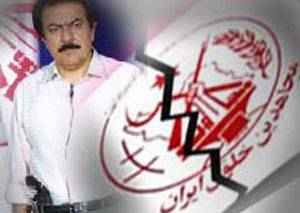 Makki Rafi'ee, a defected member of the anti-Iran terrorist Mojahedin-e Khalq Organization (MKO), complained that the ringleaders of the group have ordered their agents to torture dissidents in a bid to dissuade them from leaving.
Makki Rafi'ee, a defected member of the anti-Iran terrorist Mojahedin-e Khalq Organization (MKO), complained that the ringleaders of the group have ordered their agents to torture dissidents in a bid to dissuade them from leaving.
Rafi'ee reiterated that agents of the MKO resorted to various types of torture and pressure against him during the last 15 years that he had been jailed in the notorious Camp Ashraf in Northern Iraq.
"After 15 years of imprisonment in Camp Ashraf and tolerating various tortures by the agents of the grouplet, I managed to escape from the Camp and surrender myself to the Iraqi security forces," he added.
Noting that he has received two invitations from the UN for immigration to the Europe or returning to Iran, Rafi'ee said, "I prefer to return to my homeland, Iran, and reveal the crimes of the MKO."
The MKO ringleaders are reported to be using torture and pressure on their own dissident members, barring the dissident members from leaving the organization and joining their families.
Earlier this month, an Iraq-based right group unveiled that ringleaders of the MKO have resorted to various forms of mass killing in a bid to bring the group out of the current impasse in Iraq.
A November report by the Habilian Association, an Iran-based human rights group, said that under the direct order of MKO's Ringleader Maryam Rajavi, leaders of the terrorist group in the Camp of New Iraq (formerly known as Camp Ashraf) allow their members to receive medical aids, healthcare and other services in return for given levels of cooperation.
Based on the order, dissident members are deprived of medicine and other medical services or, at least, face much hardship and difficulty in procuring their necessary medicines.
The right group added that the new measure came after protests remarkably increased inside the group, specially in the camp. Right groups are gravely concerned that a large number of MKO members may lose their lives soon if UN, human rights and Iraqi officials do not force the group leaders to end their tortures and pressures against the dissident members.
In relevant development, a report revealed in November that Ahmad Razzani, a veteran member of the MKO, had been killed inside the Camp.
According to an August report by the Habilian Association, the MKO leaders have increased their pressures and control over the members of the terrorist group to prevent possible defection and escape by unsatisfied members.
Reports also said that all exit and entry doors have been locked and none of the members, even those suffering from acute diseases and illnesses, are allowed to leave the camp.
MKO ringleaders have ordered the camp guards to stage snap inspections of the group's members and their personal belongings under the pretext of finding the lost weapons.
Such behaviors have sparked discontent among a number of MKO members and made them escape the camp and return to their anguished families.
The MKO is behind a slew of assassinations and bombings inside Iran, a number of EU parliamentarians said in a letter last year in which they slammed a British court decision to remove the MKO from the British terror list. The EU officials also added that the group has no public support within Iran because of their role in helping Saddam Hussein in the Iraqi imposed war on Iran (1980-1988).
The group, founded in the 1960s, blended elements of Islamism and Stalinism and participated in the overthrow of the US-backed Shah of Iran in 1979. Ahead of the revolution, the MKO conducted attacks and assassinations against both Iranian and Western targets.
The group started assassination of the citizens and officials after the revolution in a bid to take control of the newly established Islamic Republic. It killed several of Iran's new leaders in the early years after the revolution, including the then President, Mohammad Ali Rajayee, Prime Minister, Mohammad Javad Bahonar and the Judiciary Chief, Mohammad Hossein Beheshti who were killed in bomb attacks by MKO members in 1981.
The group fled to Iraq in 1986, where it was protected by Saddam Hussein and where it helped the Iraqi dictator suppress Shiite and Kurd uprisings in the country.
